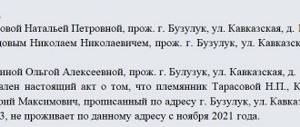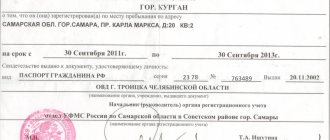The Constitution of the Russian Federation legitimizes the right of every citizen of the country to freely move and live in any part of our large state. This freedom is somewhat limited in another document. This is necessary to ensure order. Most government agencies provide services to persons at the place of registration.
Dear readers! The article talks about typical ways to resolve legal issues, but each case is individual. If you want to find out how to solve your particular problem , contact a consultant:
8 (800) 700 95 53
APPLICATIONS AND CALLS ARE ACCEPTED 24/7 and 7 days a week.
It's fast and FREE !
A person living outside his place of registration can create problems for those around him. If he commits an offense, it is quite difficult for the police to find him. The home owner will suffer losses. After all, the size of the subsidy depends on the income of the registered people. Neighbors may suffer from noisy tenants.
There is a legislative tool that allows you to resolve the conflict without the culprit. This is the execution of a special document in the presence of a commission. The sample act of non-residence at the place of registration does not have a clear structure. It is filled out manually and must comply with the basic rules for filling out business papers. Such a document is the main basis for the discharge of a citizen.
Despite its apparent simplicity, some questions remain open. Is there a punishment for a person who does not live at his place of registration? How to draw up an act correctly? Who can initiate the creation of a document?
Main purpose of paper
One of the main purposes of the document is to recalculate the amount of payment for utility services. But in reality, there are quite a lot of situations when a document may be required. Here are the most basic of them:
- Forced discharge of a tenant. If he does not have the right to an apartment, has moved, but remains registered, he can be discharged through the court. This is especially true for a situation where the fact of his registration affects the amount of utilities and general house maintenance. A properly drafted act will need to be attached to the claim.
- Receiving a subsidy. If there are modern individual metering devices, you need to draw up a report to confirm the number of people living in the premises. The paper will confirm who lives in a certain apartment, consumes resources and receives a certain income, and who does not. Based on this information, the subsidy amount will be calculated.
- Termination of the lease agreement. If a person rented housing under a contract, but moved out earlier than the deadline and does not pay rent, the act will help terminate the contract through legal proceedings.
- Creditors and collectors. Fraudsters often indicate the wrong address when concluding a loan agreement. Creditors begin to look for the debtor at the address where he is not. The act of recalculation of utility bills will help prove this fact. In the absence of metering devices, services are calculated for everyone registered. To reduce the amount of payment, you can draw up an official act of non-residence.
Along with the listed situations, the act may be required by the owner in the following cases:
- registration of state benefits and benefits;
- concluding a loan or certain legal agreement;
- obtaining education in order to work later in the tax service or perform other actions there.
These are all common situations. To understand when a document may be required, it is worth considering several specific examples.
Certificate of residence
In such a case, the person in respect of whom the fact of residence is determined must be present during the inspection of the housing. He can sign the document or refuse to sign. In the second case, the fact of refusal should be recorded in the form and certified by the signatures of the members of the assembled commission.
Here are a couple of specific examples when a residence certificate is needed:
- a legal dispute between the father and mother about the place of permanent residence of the child if they are divorced;
- collection of payment for garbage from two addresses - by actual location and by registration.
Who draws up the document?
The initiator of the document is usually the owner of the property. But the actual preparation of the paper will be done by:
- housing department employee, representative of the management company, public utility service;
- bailiff;
- district police officer;
- law enforcement representative;
- neighbors living nearby.
The owner draws up the paper only in front of witnesses. These may include any of the listed persons.
Another important rule is that one person cannot draw up a deed. Typically, a group of interested parties gathers. This could be neighbors, a police officer, a local police officer or other citizens. The main thing is that the number of people is more than three.
There are only two situations in which a citizen can independently draw up a document - without witnesses and on his own behalf. We are talking about the act of non-residence. That is, the person himself confirms the fact that he is not at the established address.
You can also draw up a document yourself in a situation where a citizen becomes aware that a fraudulent act has been drawn up, for example, for the purpose of forced eviction. He can write his act, thereby officially confirming his residence.
Act of actual residence - what kind of document is it and what is it for?
In simple terms, this act records exactly who lives (or not) in a certain apartment or house.
It is interesting that this document does not appear in any laws or even in the Housing Code. The only mention of it is contained in the Decree of the Government of the Russian Federation No. 354 “On the provision of utility services to owners and users of premises in apartment buildings and residential buildings.” However, the document is used in different situations.
Which organizations need it and why?
- Utility services.
According to the Decree of the Government of the Russian Federation, the consumer of utility services is obliged to inform the contractor (that is, the service provider) about the number of people living in the apartment. The act is submitted to the management company within five days (working days).
In addition, this document is needed to recalculate utility bills. For example, the owner leaves for a long period of time. Or lives elsewhere. If there is no act, then payments are calculated according to the number of homeowners.
But this is the case if he does not have metering devices installed. Metering devices include water, gas and heat meters.
- Management Company.
The management company needs an act on the number of residents to calculate utility bills and determine the actual load on the house.
- The Federal Migration Service.
If a person does not live at the address at which he is registered, then the FMS deals with this matter. Especially foreign citizens and stateless persons temporarily staying in Russia.
- Investigative authorities.
The police need information about your actual residence. For example, if there is an eviction case or an illegal rental case.
Thus, this document has a very wide scope of application by various authorities.
Read more: Is it possible to build without a building permit?
Registration procedure
When drawing up an act, it is important to adhere to a certain sequence of actions:
- Determine the composition of the commission. In particular, poll neighbors as to whether they agree or not.
- Inspect the premises at a predetermined time to establish the necessary fact of residence.
- Record the results of the inspection.
- Sign. This must be done by members of a pre-selected committee. Immediately after the signatures are affixed, the paper becomes legally binding.
If there are neighbors on the commission, you need to make sure that they constantly live at their address, and not from time to time, and that they use the housing legally.
Other rules for the event include:
- inspection of the property is carried out strictly in the presence of the owner; the presence of the owner’s legal representative acting by proxy is allowed;
- It is mandatory to check the presence of personal belongings of the resident or their absence when proving non-residence.
The number of beds, hygiene products, and cutlery can be used as basic evidence. You can use other options to prove that a person was in another place:
- certificates proving the fact of treatment in a hospital or being on a business trip;
- hotel invoices with specific dates;
- certificate and confirmation that a certain person is registered in another place; payment documents that confirm the division of expenses aimed at maintaining housing;
- facts of visits to clinics, housing departments or management companies officially servicing real estate.
The act is drawn up in writing. Notarization is carried out solely upon request.
Actual place of residence
The actual location is understood as the residential premises in which the citizen actually lives, although he is registered in another place.
A certificate containing information about your actual place of residence may be needed to calculate utility bills and resolve certain situations with migration authorities.
The document does not have a statutory form; the only condition is the availability of comprehensive information about the person being inspected.
Certificates are issued free of charge.
Features of each option
In general, the procedure for drawing up a document and its contents are the same for each individual case. But it is worth paying attention to the place where the act is submitted. The composition of the commission depends on this:
- Court. If a trial is initiated, each member of the commission must be present. This must be taken into account when assembling committee members.
- Subsidy. To review a paper in a public service organization, a district police officer must be present in the commission.
What does a sample act of non-residence at the place of registration look like?
Paperwork is completed by two categories of citizens: owners of residential premises or neighbors. The latter persons have the right to complain about noisy tenants. It is better to entrust the management of the procedure from the beginning to the eviction to specialists. This service is paid, so most people prefer to write the paper themselves.
Example of document formatting:
Act
about non-residence at the place of registration
Commission consisting of:
- Popov Artem Filippovich, living at the address: Volgograd, st. Yubileinaya, building 50, apt. 7, passport No. 102030 series 44 55.
- Mamontova Ella Sergeevna, permanent residence address: Volgograd, st. Yubileinaya, building 50, apt. 8, passport No. 405060 series 66 77.
- Kotov Yuri Maksimovich, living at the address: Volgograd, st. Yubileinaya, building 50, apt. 9, passport No. 708090 series 88 99.
persons actually living on Yubileinaya Street in the city of Volgograd in house number 50 drew up an act as follows:
Based on the norms of civil and housing law of the Russian Federation, we inspected apartment No. 10 of our building. The request came from the owner of the residential space, Nikolaev Igor Matveevich.
During the check it was found:
- The apartment is located on the third floor of a ten-story panel building at the address: st. Yubileinaya, 50, Volgograd.
- In addition to the applicant, Margarita Aleksandrovna Nikolaeva is registered there. The citizen has not lived at the address for more than a year. We did not find the woman’s personal belongings. There were no other signs indicating her presence.
This act was drawn up on July 11, 2020 at 13:15 at the address: Volgograd, st. Yubileinaya, building 50, apt. 10
Signature ____________ A.F. Popov
Signature ____________ E.S. Mamontova
Signature ____________ Yu.M. Kotov
I confirm the correctness of the document and its validity:
Date Signature, stamp of a notary or representative of the Housing Office
A sample act of non-residence at the place of registration drawn up by neighbors will have the same form. The text of the act needs to be modified. Instead of the owner, the initiator indicates the full name of the interested neighbor. The inspection results must contain the phrase: “The owner does not live at the address. He rents out real estate to unregistered citizens who are violating the order.”
Rules for drawing up a document
There are no special rules for registration. But, despite this, certain information must be there. The act must include:
- data of the organization where the paper will be provided;
- information about the initiator;
- information about the person whose residence or non-residence is determined;
- the exact name of the document category;
- information about the members of the commission - full name, address, position; the fact that is determined - residence or non-residence;
- postal address of the property;
- period of residence or time of absence from housing;
- signatures of commission members; date of registration;
- a note on the presence of a citizen on the date of inspection;
- citizen’s signature or information about refusal to sign the paper.






